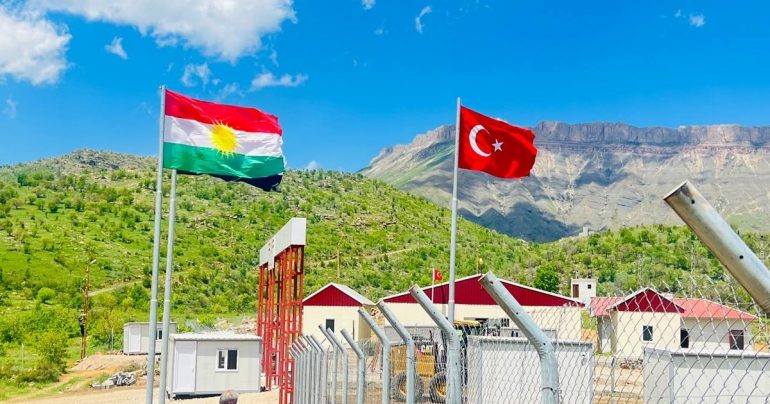Even as the counts are tallied across Turkey, the political landscape in the Kurdistan region of Iraq will have been profoundly influenced by the Turkish elections. Social media reflects a polarized environment where individuals favor either Recep Tayyip Erdogan or Kemal Kilicdaroglu. This divide mirrors the agendas stemming from the various Kurdish parties’ mutual economic, political, strategic, and ideological interests in the region.
The Kurdistan Democratic Party (KDP) is observing the elections with considerable caution. Despite its long and robust political, military, and economic relationships with Erdogan over the past 20 years—such that it is sometimes referred to as Turkey’s proxy party—the KDP is preparing for a possible power shift. Consequently, it is focusing its vision and strategy on Baghdad more than ever before. Nechirvan Barzani, the current president of the Kurdistan Region and a KDP member, emphasized that “our strategic depth is Baghdad; the solutions to our problems are there, not anywhere else.”
All KDP officials and media outlets have refrained from endorsing or opposing any sides. NRT English reached out to several KDP officials for a comment on the party’s stance, but all declined.
The election results will profoundly influence the KDP’s military and security relationships with the next Turkish government. If Kilicdaroglu is elected with the help of the pro-Kurdish Peoples’ Democratic Party (HDP) — which fiercely opposes Erdogan after a crackdown on its members in recent years and has declared its support for Kilicdaroglu for the presidency— he may end Turkish operations in the Kurdistan region and Syria. This could pose real challenges for the KDP in its cold war with PKK guerrillas, who are lodged in the mountains of the Kurdistan Region. The KDP and KDP leaders in the KRG have demanded the PKK leave Kurdistan Region territory on many occasions. There have even been (limited) direct confrontations, including what the KRG described as a PKK attack on Peshmerga positions in Chamanke. Though such wholesale changes to Turkish foreign policy are unlikely in the short term.
The KDP can continue to enjoy its economic relations with Ankara based on mutual interests through the Ibrahim Khalil border crossing and the newly-opened Zet border opening, located in the KDP-dominated Soran administration. These routes could boost economic ties as preparations for commercial transport with Turkish companies heavily invested in the region continue.
In contrast to the KDP, the Patriotic Union of Kurdistan (PUK), which governs the Sulaimaniyah region, hopes for a “drastic transformation” in Turkey. They support the pro-Kurdish HDP’s decision to back Kilicdaroglu. The PUK’s stance stems from the evident divide between the party and Ankara in recent years, largely due to the PUK’s close relationship with the Kurdistan Workers’ Party (PKK).
This rift deepened after Turkey’s decision to close the airspace and its recent attack on Sulaymaniyah Airport, believed to be reactions to increased contacts between the PUK and the U.S.-backed Syrian Democratic Forces (SDF). The SDF includes the PKK’s Syrian offshoot, the Democratic Union Party (PYD). PUK leader Bafel Talabani’s interactions with the SDF and comments about Kurds in Turkey have strained relations with Ankara further.
Farid Asasad, Secretary of the PUK Leadership Council, backs the HDP’s decision, stating that the PUK is observing the elections “with great interest” because they believe that Turkey needs radical changes in its political system, domestic and foreign policy, and relations.
“The Kurds are the third largest party in the Turkish parliament and know how to act because they are conscious people who decide according to their own interests,” he said.
The Islamic parties in Kurdistan, the Kurdistan Justice Group (KJG) and the Kurdish Islamic Union (KIU), openly endorse Erdogan due to his conservative Islamic background and ideology. They believe that Turkey’s elections represent a struggle between two projects: one that aims to reintegrate Turkey into the Islamic world, represented by Erdogan, and another that seeks to secularize Turkey again, represented by Kilicdaroglu.
Abdulstar Majid, head of the KJG’s faction in Kurdistan’s parliament (which stepped down in unison last month), stated in a Facebook post that “Kemal Ataturk’s Republican People’s Party, now led by Kilicdaroglu, has brought all the suffering and misery to the Kurdish people under its secular regimes.
“In terms of religion, Erdogan and his rule have been more open, have changed laws, and defended Islamic causes in the world, such as the Palestinian cause. If you compare Kilicdaroglu and Erdogan, Erdogan is definitely better,” he said.
On Wednesday, 66 figures from the Islamic world issued a statement calling on Turkish Muslims to vote for Recep Tayyip Erdogan in the elections and urged Muslims outside Turkey to support Erdogan in every possible way.
Among them are several Kurdish figures, including Dr. Ali Karadaghi, Secretary General of the World Union of Muslim Scholars, who tops the list, and Dr. Sayed Ahmad Penjweni, head of the World Union of Muslim Scholars in the Kurdistan Region.
Said Ahmed Penjweny of the KIU expressed support for Erdogan and urged Turkish Muslims to vote for him in the upcoming elections. The statement also encouraged Muslims outside Turkey to provide support to Erdogan in any way possible.


